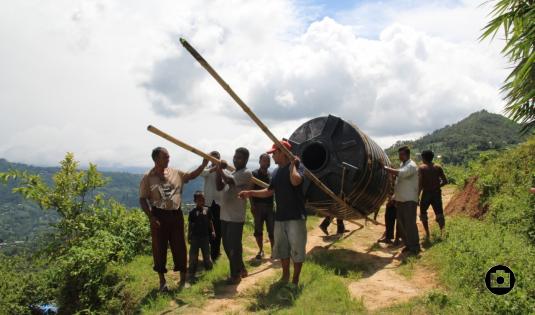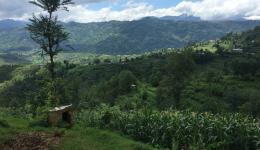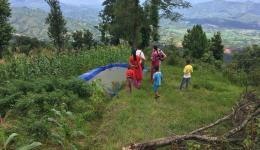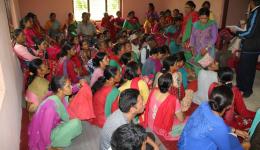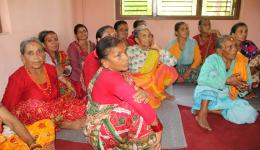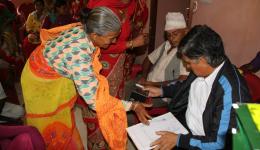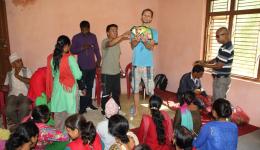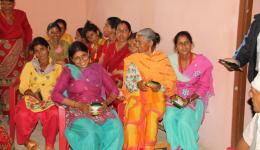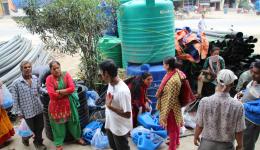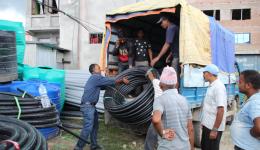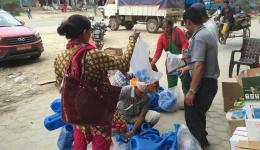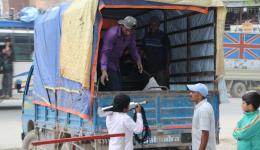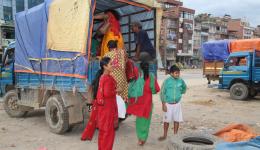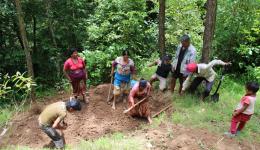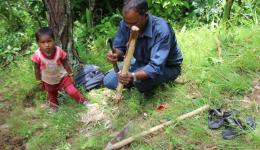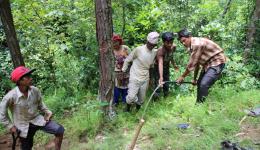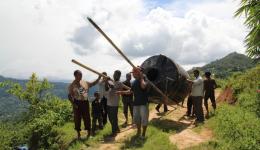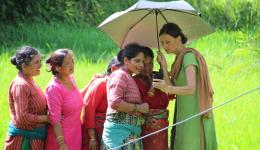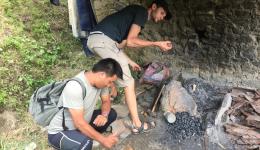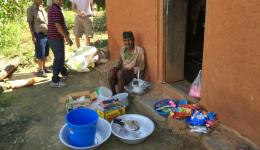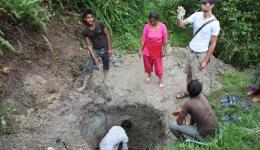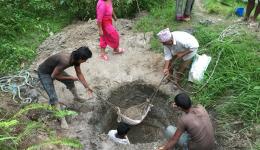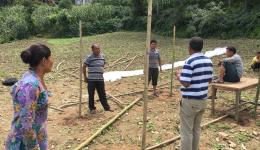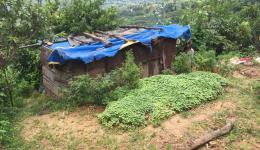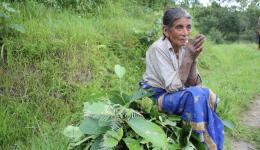Registered Nonprofit
Association for the Support
of Children and Needy
People Around the World
Unterstützung
Earthquake area in Nepal
Wed, August 17, 2016 - 10:10pm, written by Michael, published by Frank
Report on trip to Nepal – team safely back home
On August 4, Alexandra and Michael start once more to Nepal on behalf of FriendCircle WorldHelp.
On site Mingmar from Kathmandu (Nepal), Sunny from Delhi (India) and Madan from Dulikhel (Nepal) strengthen the team.
In a first team meeting at the hotel after our arrival in the morning it becomes clear that due to diplomatic/bureaucratic obstacles the planned school building in the Gorkha area cannot be tackled during our 10-day stay. Madan, who works in a public agricultural agency reports that many people from poor farming villages approach him with their problems. In many cases due to limited financial possibilities the government cannot adequately help.
The next day we set off directly to the region around Dhulikhel to visit mountain villages. After some discussions we meet very poor residents of the lowest caste of Dalits. At the beginning, people dare hardly speak, let alone talk about their problems. Gradually, it turns out that the approximately 200 people in this village suffer from extreme poverty. The most urgent problem is water. The monsoon season is just coming to an end, and each liter of water which is urgently needed for men and animals has to be arduously carried from the valley uphill. So, every family has to go down the approximately 1 km long serpentine narrow path with about 200 m altitude difference four to five times a day to fetch the precious liquid. 60-100 kg baskets have to be carried uphill with browbands. Had we not seen it with our own eyes, we would not believe that such physical effort is possible.
Besides cattle breeding and agriculture, which however due to the lack of water yields only one harvest per year these people have no other earning opportunities.
First we are still very skeptical whether there is a possibility to improve the muddled situation of these people. In India we have built deep wells in such situations. This is of course not possible in mountain regions. We have them show us the source. On this occasion we can also explore the steep path. Even with no weight on our back, we must uphill pause several times to breathe. In the valley, there is indeed a sufficient water-bearing source.
After a detailed analysis we develop the following plan:
1. Construction of a 2000 liter water tank in the valley with water of the source being introduced by a hose.
2. Pumping the water from tank 1 in another 2000 liter tank (middle station 1)
3. Further pumping to the middle station 2 (2000l)
4. Pumping of the water from middle station 2 to a tank on the mountain top (5000l), from where the water is distributed by gravity into the vicinity of the houses.
Required material:
3 x 2000l plastic tanks, 1 x 5000l plastic tank, 1000m hose and cable, 3 high performance pumps, various tools, connectors, etc.
Due to the time shortage with our planned return trip on August 14, during a joint meeting we put some pressure on the mountain farmers and promise to complete the project still during our stay provided they cooperate. The then observed speed and zeal are stunning and proves how vital this project is for the people concerned. Early next morning we already find at the source people with shovels and hoes entrenching the already rolled hose and digging a hole for the tank.
Mingmar translates that one of the men wanted to start already at night so that the project would successfully be completed this week. Fortunately, he could be restrained by his family and the neighbors because there are tigers, mountain lions, bears and snakes. During the day and in crowded areas there is usually no encounter between humans and animals, though the team could watch an approx. six-foot long python creeping past, luckily at sufficient distance ...
Due to the strong willingness of the villagers to work we are constantly busy with shopping downtown in Banepa, a town some 30 minutes away and the material transports. In addition, four more villages are visited, for which we buy a total of 65 greenhouses to enable farmers to achieve year-round crops and sell the products on the market. People are overjoyed about this relatively simple measure. At many places they immediately after receipt of the material start to construct the 20x10m bamboo scaffolding which is then covered by a plastic sheet. In many places, the construction has to wait because the maize has not yet been harvested.
50 minutes away in the village Methinkot the farmers have been on high and dry since the earthquake. During our trip we learn in many places about the aftermath of this natural disaster. In many villages the water sources have moved underground resulting in partly extreme lack of water. Also, many houses are still in ruins or uninhabited due to collapse hazard. In Methinkot upon our request to present a solution people show us a place in the valley where a 15-meter deep well is to be drilled and secured with concrete rings. Then the water is to be pumped into an existing but now mostly empty water tank on village level.
The simultaneous processing of projects in four villages, the bulk buying and the adapting of plans to the local circumstances requires a lot of flexibility and power on our side. In addition there are the steep, rocky paths we have to drive up and down by jeep and the paths that are partly only accessible on foot. However, the entire team is driven by the zeal and the firm will to complete the projects.
Once during our driving back and forth the team stops as we see a man with crutches carrying on his head a basket with waters tanks, walking down the street. We find out that the man is extremely poor and despite the pains from an ankle injury has to fetch water from a source located about one kilometer downhill as he is not able to pay the 30-Euro connection to a nearby community water line. The various containers in his basket weight at least 50-60 kg. We visit his house on a way leading over rough terrain from the road through a dense cornfield. There we meet his 16-year old daughter. She tells us that her mother had died a few years ago and she is left alone with her father who is producing sickles and other metallic tools with fire and a hand fan to provide for their daily living. We have a closer look at the house and note that everything is very tidy, but there is literally EVERYTHING missing.
The following day the team completely buys out a small home shop to provide the small underprivileged family (again belonging to the Dalits caste, the „untouchables“) with dishes, pots, food, etc. Since there is the possibility of a connection to the water line of a higher village, we visit this village two days later. People there are also very poor and report that the water flows only every three to four days due to the many power outages. Also here, the water is pumped from a source in the valley along several stations to the summit, however, there is no collecting tank. FriendCircle WorldHelp will pay for a 5000l tank provided that in return the poor widower and his daughter will not have to pay monthly cost and that they get help for the connection. People gladly agree and are very happy with this solution. To our surprise the required hose is installed within a short time with the help of the villagers.
During the water project in Bhach Pokari the artisanal talents of some farmers who work in the city become so obvious that we start thinking about further sustainable promotion opportunities. This is the only way to stop the rural exodus and the multiple emigrations of young people. It turns out that some men and women are skilled in sewing and art forging. We therefore plan the establishment of a production and training center during our next trip in November. This way, the entire village can develop long-term and the overageing can be avoided. The goods produced can then be sold in the city.
THANKS to ALL friends at home! It is only through your continuous assistance that the work of FriendCircle WorldHelp can go on!
Thu 11/08/2016 - 21:38, written by Frank, published by Frank
Photo album with picture story
Alexandra and Michael are presently traveling in the mountains and visiting various locations. The farmers there are supported with material for greenhouses, seed, water pipes and tanks and pumps for pumping. Every day the villagers are carrying hundreds of liters of water on their heads over long distances up the hill to supply humans and animals with drinking water. New photos can be found in the gallery: simply click on the large photo above to get an overview. By clicking the photos will enlarge ...
Mon, August 8, 2016 - 9:20pm, written by Frank, published by Frank
Again on the road in Nepal
Since last Thursday, Michael and Alexandra are traveling in Nepal. Upon arrival in Kathmandu on Friday, Mingmar and Sunny were already waiting for them. The next few days they have a tight program. Today we received the first photos from Nepal. Alexandra and Michael are presently underway near Dhulikel, together with Mingmar and Sunny. More information and first reports will follow soon...
Here are in advance a few photos showing the impressive and beautiful nature. However, these pictures belie the harsh living conditions of the farmers in the mountains. Since the heavy earthquake in 2015, many water sources have moved underground so that people partially now have to walk long distances for each bucket of water...
